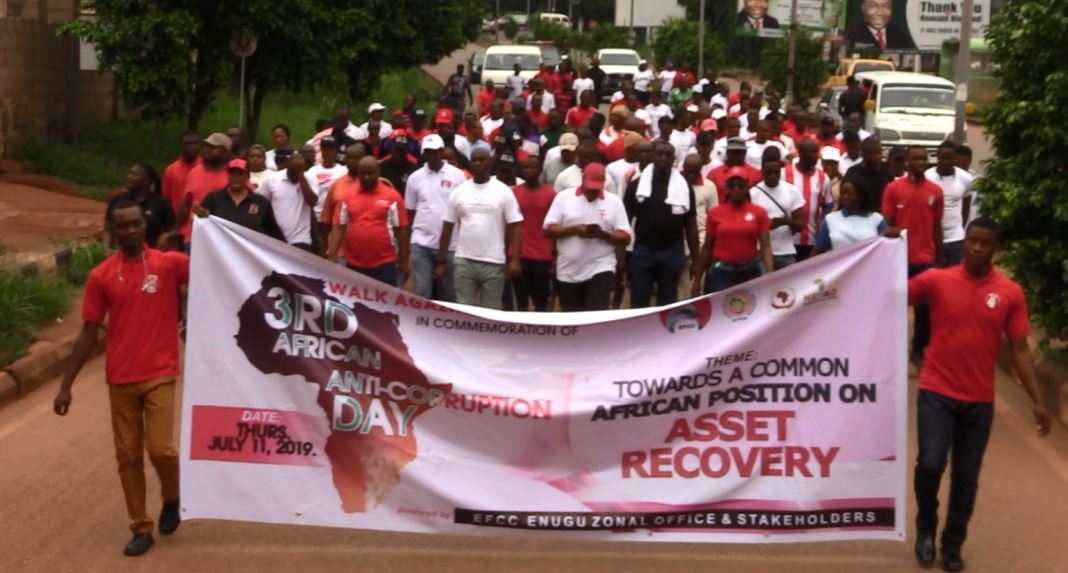|
Getting your Trinity Audio player ready...
|
The Economic and Financial Crimes Commission, EFCC says the continent of Africa is losing over 50 billion dollars annually to corruption through illicit financial outflows.
The South-East Zonal Head of the Economic and Financial Crimes Commission, EFCC Usman Imam, disclosed this at the 3rd African Anti-corruption Day celebration in Enugu with the theme: “Towards a common African position on Asset Recovery”.
He solicited the support of trade unions and Civil Society Organisations (CSOs) to facilitate mass education against corruption.
According to Imam said the effect of corruption had become hydra-headed that all Nigerians irrespective of political, religious and ethnic divides were needed to be fully part of the fight against it.
He said the EFCC was committed to winning the corruption war no matter how long it took, adding that to do that “Nigerians needed to join in the fight.
The EFCC zonal head said that the Federal Government had particularly made the fight against corruption and the recovery of stolen assets a key agenda for the current administration which he said has translated to significant recoveries of public funds.
“I want to assure you that EFCC is committed to winning the corruption war no matter how long it takes even as we call all stakeholders and well-meaning Nigeria to not only support us but to own this war”.
“Unless and until Nigerians, determine to expose and hold public officials accountable for their stewardship, and also not see the fight against corruption from ethic, political, religious perspectives, the war might never be won even if battles are won,” He said.
“Therefore, we call on leaders of trade unions, civil society and professional bodies to facilitate mass education and enlightenment of their members even as we promise to partner with them this purpose”.
According to him, the African anti-corruption day had its roots on a series of events leading to an African Union Convention on Prevention and Combating Corruption adopted in Maputo, Mozambique on July 11, 2003.
The event had in attendance, officers of relevant government agencies, and featured a road march around Enugu metropolis.
READ FULL TEXT OF THE SPEECH BY THE COMMISSION’S ZONAL HEAD.
“The occasion today traces its history to a series of events leading to an African Union convention on preventing and combating corruption adopted in Maputo, Mozambique on July 11, 2003. In cognizant of this, the African Union adopted 11th July as the African Anti- Corruption Day. This year marks the 3rd Edition of the African Anti- Corruption Day under the theme “Towards a common African position on Asset Recovery”.
The objectives of this occasion include the following:
To bring together all relevant anti-corruption stakeholders (Domestic and International) to reflect on the challenges of asset recovery in Africa and solicit contributions and support towards developing a framework for an African Common Position on Recovery.
To create awareness and engage the citizens in asset recovery efforts.
In Nigeria, just like every other African country marking the occasion, we have been served with very high dosage of the poison called corruption, but unlike other countries, Nigeria has one of the most far-reaching and deeply entrenched culture of corruption in the continent, if not the world. This is manifested in the increasing large number of corruption related investigations, litigations, convictions and recoveries made by EFCC.
This year’s theme is quite timely and relevant considering the relationship between corruption and Asset recovery. Assets may include monies in bank accounts, real estate, vehicles, arts and artifacts, and precious metals.
Understandably, one may ask why asset recovery and of what relevance is it to the anti-corruption war?
In fact, without asset recovery, especially in certain peculiar corruption cases, the whole effort of fighting corruption would have been futile.
By way of definition, Wikipedia defines it as “the task of recovery of assets that have been wrongfully take either stolen, fraudulently misappropriation or otherwise disposed of to remove them from their rightful owner.
“Asset recovery has three main elements-identification, redeployment, and divestment.”
Internationally, it is any effort by governments repatriates the proceeds of corruption hidden in foreign jurisdictions. Such assets may include monies in bank accounts, real estate, vehicles, arts and artifacts, and precious metals. As defined under the United Nations convention against corruption, asset recovery refers to recovering the proceeds of corruption, rather than broader terms such as asset confiscation or asset forfeiture which refer to recovering the proceeds or instrumentalities of crime in general.
Often used to emphasis the “multi- jurisdictional “or cross-broader aspects of a corruption investigation, international asset recovery include numerous processes such as the tracing, freezing, confiscation, and repatriation of proceeds stored in foreign jurisdictions.
According to the high level panel on illicit financial flows (IFF), African continent is losing in excess of $50 billion a year through illicit financial outflows. A large portion of these outflows is made up of illegally acquired assets that are located all over the world. Asset tracing , freezing, management and eventual repatriation is a long and complex process which eventually takes away the benefit from the crimes, eventually serves as a deterrence to IFF.
Heads of Anti-corruption Agencies in Africa have persistently sought for the support and collaboration of the Global community in repatriating stolen assets back to Africa countries. The need to strengthen international co-operations amongst the anti-corruption agencies in Africa for purpose of development an African common position framework n asset recovery and return can therefore not be over –emphasized.
The Government of President Muhammadu Buhari has particularly made the fight against corruption in Nigeria and the recovery of stolen assets a key agenda for the administration.
This has translated to significant recoveries of looted assets that were acquired through mismanagement of public funds.
Over the past four years, the Nigerian government has advocated for the return of its stolen assets from foreign jurisdictions with lax AML/CFT regime.
It is expected at the end of the programme that, issues on “A common African position on Asset Recovery” will be tackled, as draw up a whitepaper on implementation strategy in the continent to guide on the fight against corruption cum asset recovery.
Also it will essentially address the following issues;
Identify relevant stakeholders (LEAs, institutions, organisations, civil society organisations, international Development partners, Embassies of relevant countries, financial institutions and DNFBPs (especially NPOs) that will serve on the committee for developing framework towards a common African position on Asset Recovery.
- Bring up an end to unnecessary conditionality for asset recovery and return.
All these are in recognition that our people suffer the most from the loss of financial assets .
I want to assure you that EFCC is committed to winning the corruption war no matter how long it takes even as we call all stakeholders and well-meaning Nigeria to not only support us but to own this war.
Unless and until Nigerians, determine to expose and hold public officials accountable for their stewardship, and also not see the fight against corruption from ethic, political, religious perspectives, the war might never be won even if battles are won.
Therefore, we call on leaders of trade unions, civil society and professional bodies to facilitate mass education and enlightenment of their members even as we promise to partner with them this purpose.
I sincerely appreciate all those who share our concerns and commitment to saving our country from this cancer called corruption and equally more especially, those who have come out to walk with us against corruption. Together we shall win this war!




